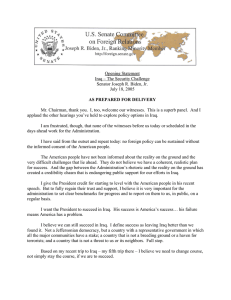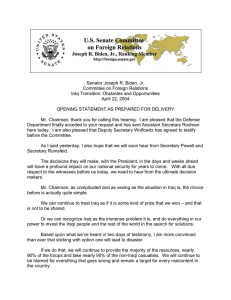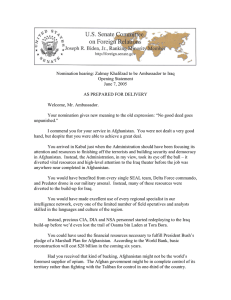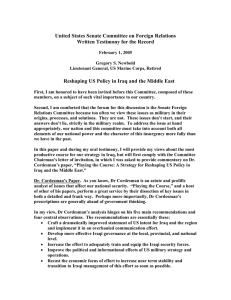Senate Committee on Foreign Relations Chairman Richard G. Lugar
advertisement
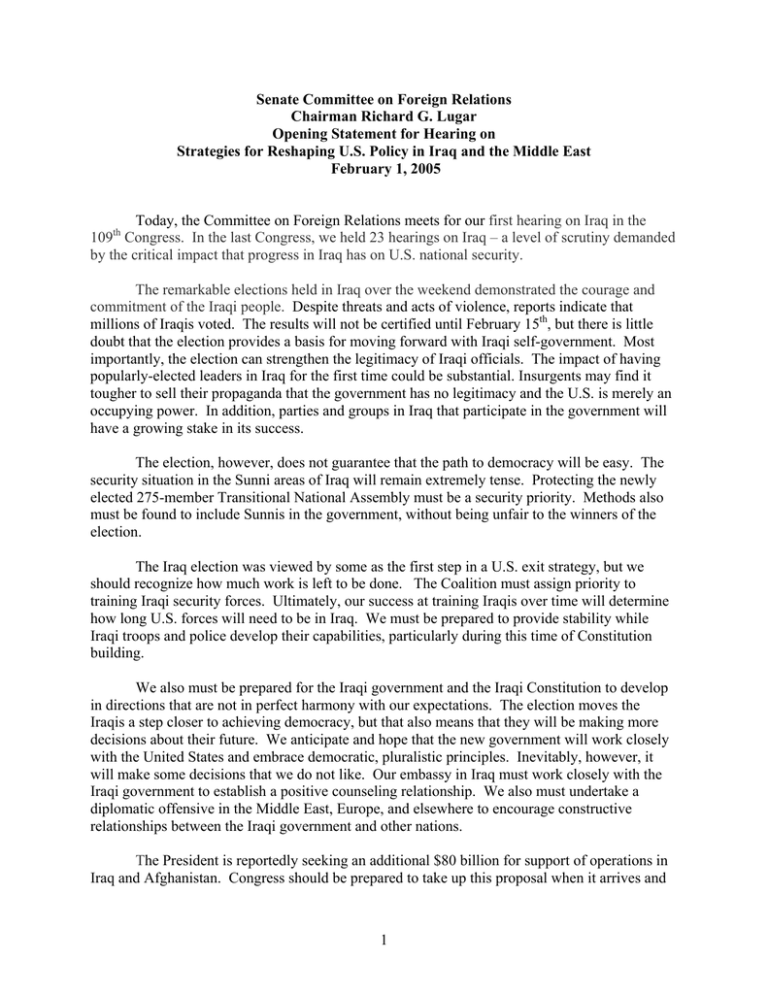
Senate Committee on Foreign Relations Chairman Richard G. Lugar Opening Statement for Hearing on Strategies for Reshaping U.S. Policy in Iraq and the Middle East February 1, 2005 Today, the Committee on Foreign Relations meets for our first hearing on Iraq in the 109 Congress. In the last Congress, we held 23 hearings on Iraq – a level of scrutiny demanded by the critical impact that progress in Iraq has on U.S. national security. th The remarkable elections held in Iraq over the weekend demonstrated the courage and commitment of the Iraqi people. Despite threats and acts of violence, reports indicate that millions of Iraqis voted. The results will not be certified until February 15th, but there is little doubt that the election provides a basis for moving forward with Iraqi self-government. Most importantly, the election can strengthen the legitimacy of Iraqi officials. The impact of having popularly-elected leaders in Iraq for the first time could be substantial. Insurgents may find it tougher to sell their propaganda that the government has no legitimacy and the U.S. is merely an occupying power. In addition, parties and groups in Iraq that participate in the government will have a growing stake in its success. The election, however, does not guarantee that the path to democracy will be easy. The security situation in the Sunni areas of Iraq will remain extremely tense. Protecting the newly elected 275-member Transitional National Assembly must be a security priority. Methods also must be found to include Sunnis in the government, without being unfair to the winners of the election. The Iraq election was viewed by some as the first step in a U.S. exit strategy, but we should recognize how much work is left to be done. The Coalition must assign priority to training Iraqi security forces. Ultimately, our success at training Iraqis over time will determine how long U.S. forces will need to be in Iraq. We must be prepared to provide stability while Iraqi troops and police develop their capabilities, particularly during this time of Constitution building. We also must be prepared for the Iraqi government and the Iraqi Constitution to develop in directions that are not in perfect harmony with our expectations. The election moves the Iraqis a step closer to achieving democracy, but that also means that they will be making more decisions about their future. We anticipate and hope that the new government will work closely with the United States and embrace democratic, pluralistic principles. Inevitably, however, it will make some decisions that we do not like. Our embassy in Iraq must work closely with the Iraqi government to establish a positive counseling relationship. We also must undertake a diplomatic offensive in the Middle East, Europe, and elsewhere to encourage constructive relationships between the Iraqi government and other nations. The President is reportedly seeking an additional $80 billion for support of operations in Iraq and Afghanistan. Congress should be prepared to take up this proposal when it arrives and 1 debate it soberly. We do not expect the request to include more infrastructure reconstruction funds, but we do expect that it will include money to build and to operate the embassy in Baghdad and to meet the urgent needs of training and equipping Iraqi security forces. Passage of such a bill would be a strong signal to the world and to Iraq about U.S. staying power. We are pleased to welcome back to the Committee Dr. Anthony Cordesman, holder of the Arleigh A. Burke Chair for Strategy at the Center for Strategic and International Studies. Dr. Cordesman has testified before the Committee on many occasions. We are grateful that we can draw on his knowledge once more. We also welcome retired Lieutenant General Gregory Newbold, Managing Director of GlobeSecNine and Executive Director of the Potomac Institute of Policy Studies. Before retirement, General Newbold was the Director for Operations on the Joint Staff. Finally, we welcome Mr. Peter Khalil, who was the Director of National Security Policy for the Coalition Provisional Authority in Iraq from August 2003 to May 2004. He is now a visiting Fellow at the Saban Center for Middle East Policy at The Brookings Institution. Today, the Committee will use Dr. Cordesman’s exceptional paper, “Playing the Course: A Strategy for Reshaping U.S. Policy in Iraq and the Middle East,” to provide a framework for our discussion of policy issues in Iraq. Following Dr. Cordesman’s testimony, the Committee will ask that General Newbold and Mr. Khalil provide commentary and remarks on Dr. Cordesman’s conclusions and prescriptions. The Committee has taken no position on the contents of Dr. Cordesman’s paper. Rather, it is our hope that by using this format, our Members can have a more productive and focused dialog with our witnesses. ### 2



